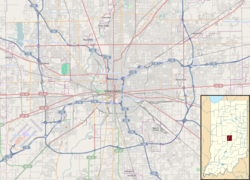Christamore House | |
 Christamore House, April 2011 | |
| Location | 502 N. Tremont St., Indianapolis, Indiana |
|---|---|
| Coordinates | 39°46′29″N86°12′4″W / 39.77472°N 86.20111°W |
| Area | 1.1 acres (0.45 ha) |
| Built | 1924-1926 |
| Built by | Brown, Eugene H. |
| Architect | Russ, Willam Earl |
| Architectural style | Colonial Revival, Georgian Revival |
| NRHP reference No. | 85000597 [1] |
| Added to NRHP | March 21, 1985 |
Christamore House is a historic settlement house associated with Butler University and located at Indianapolis, Marion County, Indiana. It was built between 1924 and 1926, and is 2+1⁄2-story, U-shaped, Georgian Revival style brick mansion. It consists of a two-story, five-bay, central section flanked by one-story wings. It has a slate hipped roof and is nine bays wide, with a three-bay central pavilion. The building features large round-arched windows and contains an auditorium and a gymnasium. [2] : 2–5
It was added to the National Register of Historic Places in 1985. [1]


